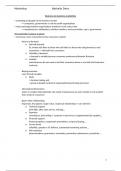Marketing Nathalie Dens
Business to business marketing
= marketing to (people in) the business market
=> companies, governments or not-for-profit organisations
= value exchange between organisations anywhere in the value chain
=> manufacturers, wholesalers, retailers/resellers, service providers, ngo’s, government
Characteristics business markets
= enormous, more money/items than consumer markets
- Nature of demand
o Derived demand
Ex. Invista sells fibre to those who sell fabric to those who sell garments to end
consumers => derived from consumers
o Volatility of demand
= demand is variable because consumer preferences/behavior fluctuate
o Inelastic
manufacturers do not want to led their customers down or are tied into fixed-price
contracts
- Buying processes
more formal/complex
o DMU
= decision making unit
= group of people involved in organisational purchasing processes
- International dimensions
easier to conduct internationally, the needs of businesses are more similar to one another
than needs of consumers
- Buyer-seller relationships
important, few players, larger value, reciprocal relationships = core element
o Technical support
joint R&D, after sales service, training,…
o Expertise
consultancy, dual selling (= customer’s sales force is supplemented by supplier),…
o Financial support
financing options, cooperative promotions, reciprocal buying,…
o Service levels
reliability, speedy or JIT delivery, automated reordering systems,…
o Risk reduction
demonstrations, guarantees, warranties, preventive maintenance, proactivity,...
1
, Marketing Nathalie Dens
Types of B2B customers, goods, services
- Organisational customers
o Commercial
Distributors, original equipment manufacturers (OEMs), wholesalers, retailers, …
o Government
Health, policing, education, transport, environmental protection, national defense
and security, …
o Institutions
Not-for-profit organizations (churches, charities), community based organizations
(housing associations), government related organizations (hospitals, schools)
- Business goods/service
o Input goods
= have been subjected to different levels of processing => lose their individual
identities and become part of the finished item
raw materials, semi-manufactured parts, finished goods
o Equipment goods
= necessary for manufacturing/operations, cannot be identified in finished product
= capital/investment goods
land, buildings, computer systems, machine tools
o Supply goods
= necessary to keep production/organisation running
= ‘consumables’, maintenance, repair, operating materials (MRO)
Lubricants, paints, screws, cleaning materials, computer, IT servicing
Outsourcing:
hiring outside a company to perform services/create goods that were traditionally performed in-
house by the company’s own employees and staff
Organisational buying behavior
= decision making process by which formal organisations establish the need for purchased products
and services and identify, evaluate and choose among alternative brands and suppliers
- Processes of decision making units
o Straight rebuy
= purchasing department reorders on a routine basis without making adjustments
Office supplies, utilities, …
o Modified rebuy:
= requirement is not new, but is different from previous situations
Adjustments to solution, negotiation on price levels, alternative delivery, …
More information needed, more participants involved
o New task
= new purchase
Higher cost/risk: more participants, more efforts
Greatest opportunity and challenge for marketers
Reach key figures in DMU + provide help and information
2




